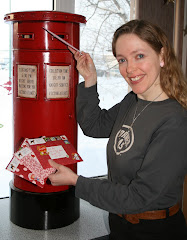Good morning,
I'm the Rev'd Steven Page, from St Patrick's Anglican Church. August
is a big month for sports. The Canadian Football League is in full
swing, while south of the border the American pro and college leagues
are in full pre-season training camp mode. Baseball is in full swing,
with the pennant races heating up. Golf season is at its peak, and
the pros will play one of the Majors mid-month. And oh yeah, the
Olympics are in full swing in London, England.
With all this
sports activity, our daily devotional moments for August will draw
our images and metaphors from the world of sports, with an occasional
assist from the book “Devotionals from the World of Sports” by
John and Kathy Hillman. If you miss any of these devotionals, we will
post them online on our blog at plaideggnog.blogspot.com, and on
YouTube.
Now, I don't
know about you, but I am spending some of my spare time these days
watching the Olympic Games from London. I love the national colours,
the excitement, the pride, the best efforts from so many fine
athletes.
The Olympics
are truly a global time of friendship and competition. This year
there are 216 different countries competing in the Olympics, ranging
from Afghanistan to Zimbabwe. But they have not always been so
friendly. Back in 1980, the Games were held in Moscow, in the former
USSR. It was the height of the Cold War between the West and the
Communist Block. In protest of the 1979 Soviet invasion of
Afghanistan, 65 countries boycotted the Moscow Games in 1980,
including Canada and the United States.
In response,
when the 1984 Olympic Games were held in Los Angeles, California, 14
Eastern Block countries boycotted those Games, including the USSR,
Cuba and East Germany.
Well, by 1986,
people who were tired of all the political posturing and boycotts
organized the Goodwill Games. The events were held in Moscow, and
included athletes from 79 nations, from both sides of the previous
Olympic boycotts.
One of the
notable athletic feats in the Goodwill Games was Jackie
Joyner-Kersee's performance in the heptathlon. The Heptathlon is a
series of seven events, including the 100m hurdles, the high jump,
the shot put, the long jump, the javelin throw, 200m sprint, and the
800m race.
Athletes get
points for how well they do in each event. Faster times and farther
distances earn more points. Jackie had a great competition. After 6
events, she was in line for the gold medal, and it was also possible
that she could set a new world record in the process.
In the final
event, the 800m race, she ran an incredible race, scoring enough
points to shatter the previous world record. Her performance and
personality won over the mainly-Soviet audience. They readily forgave
her for being an American, from one of the enemy countries, and for
beating their own stars. The fans cheered her with genuine warmth and
excitement.
The goodwill
and reconciliation between nations and the willingness to forgive one
another, both as individuals and as countries, mirrors one of the
main teachings of Jesus. His disciples asked, in Matthew 18v21, how
often they should forgive someone who wrongs them. Peter suggested
maybe 7 times (a Heptathlon of forgiveness!). He likely thought he was
being very generous, very kind and forgiving.
Imagine his
surprise when Jesus answers, no, don't stop at seven. Forgive them 70
x 7! I don't think Jesus meant to forgive them 490 times. After all,
if we're keeping count, we have not really forgiven them at all, have
we? We need, Jesus says, to be ready to forgive one another as often
as it takes. That's what having the love of God for others in our
hearts means. It can be just as hard as the heptathlon. But that's
the challenge of love and forgiveness Jesus gives us. ... For St
Patrick's church, I'm the Rev'd Steven Page.








No comments:
Post a Comment